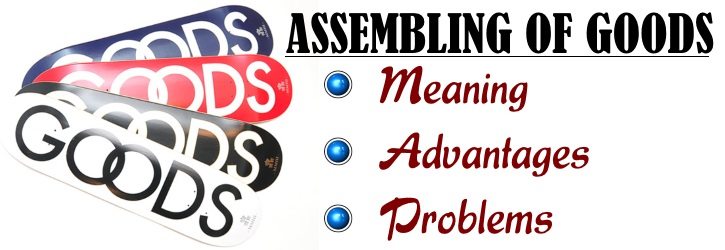Assembling of Goods | Meaning | Advantages | Problems
Table of Contents
What is Assembling of Goods?
Assembling refers to the process of keeping the goods, purchased from different places, at a particular place. Assembling of goods is done only after they have been bought. Certain amount of assembling is done by the consumers also.

Example of Assembling of Goods
We may buy the goods needed for household use from various sources and keep stock. A manufacturer may buy different kinds of raw materials from different sources and keep these in his stores. A trader also buys goods from different manufacturers and keeps these in his shop to be sold to consumers.
Advantages of Assembling
1. For a manufacturer it ensures availability of raw materials and avoids shortage of stock.
2. A trader, who buys from different manufacturers, is able to offer choice to his customers.
3. It results in savings in transportation costs and handling charges for a manufacturer as the frequency of buying is reduced.
4. It also guards a manufacturer against scarcity of raw materials that may hamper production.
5. As consumers, we tend to buy and keep stock of certain goods that may not be required immediately. But ‘these may be required in future.
6. The production of certain goods is seasonal but their consumption is perennial. Example: Agricultural goods.
On the other hand, the consumption of certain goods is seasonal but their production is perennial. Example: Crackers. In either case assembling is required.
Problems in assembling of Goods
1. Assembling depends much on the availability of storage facilities. Absence of proper storage may not allow the performance of assembling function.
2. The perishable nature of certain goods (fruits and vegetables) may not provide scope for assembling.
3. Certain goods have a tendency to become outdated quickly. Keeping stock of such goods may only result in loss. Example: Electronic goods.
4. Excessive stock only results in blockage of capital.
5. The quality of certain goods deteriorates with the efflux of time. They may have to be discarded once their expiry date lapses. Example: Medicines.

